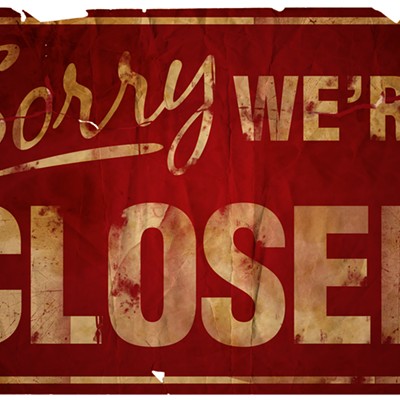Last Monday, she sat with about two dozen colleagues at the back of a hearing in Phoenix, listening as two lawyers verbally duked it out over the validity of a new law that is intended to protect the public, but has kicked Crockett and company out of a job. It's not exactly where she expected to be three decades into her career, but then again, the last six months have been full of harsh surprises. ("Head Games," May 6)
"I'm not a betting person," she said, explaining her reluctance to predict an outcome in a case that will likely go a long way toward determining her professional future. "I've had feelings about it the other times, and all that ever happened was that it got postponed. And so I'm just laying off that stuff. Our attorney felt positive about it. But he has been before, too."
Last year, the state Legislature passed a new law requiring anyone working in the fields of psychiatric and behavioral health to hold a professional license. At the time, Arizona was one of only three states still lacking a binding credential, and initially, the new law was welcomed by nearly everyone.
For the public, it established a safety net, giving them legal recourse against counselors who abused their position. And for the state's thousands of practitioners, it promised to lend legitimacy to a field that had seen its status suffer due to a lack of regulation.
But attitudes quickly changed as some of the Arizona's most experienced mental health professionals soon discovered that the state's Board of Behavioral Health Examiners--the agency charged with implementing the new law--was making it virtually impossible for many them to continue practicing.
Jackie Crockett moved to Tucson in 1991 after 15 years in private practice as a social worker in Minnesota. Though she'd been licensed under a mandatory scheme that had been in effect there for years, when she arrived in Arizona, she discovered that the one state credential available had been created only two years earlier and was entirely voluntary.
"I had already gone through a level of hoops in Minnesota," she said. "What they have there is a four-tiered system, and I got licensed at the highest level. Arizona, even now, does not have that level of licensure."
So, given the option of going through another involved application process and paying another certification fee in order to be granted a credential that offered no professional prestige and was entirely voluntary, she didn't see much point. And neither did thousands of other counselors and social workers already practicing in Arizona. The old certification scheme, in fact, was so porous that state legislators even cited its ineffectiveness as the key reason for creating a mandatory licensing scheme.
When the new bill was passed into law in April 2003, it contained no grandfather clause--only a provision that would automatically grant professional licenses to anyone who could get certified before June 31, the day before the law became effective.
Earlier this year, after more than a decade practicing in Arizona, Crockett finally sent off her application for certification. But what she'd expected to be mere formality turned into a serious matter when an administrative review of her application deemed it to be irreconcilably deficient. It seemed the rules had changed.
When the state Legislature passed the new law last year, it largely left it up to the board's credentialing committees to determine what the new minimum standards for licensure would be. And though implementation of the law itself was still 15 months away, the board decided to go ahead and apply its new standards immediately. Since the process of credentialing is largely based on a review of academic and professional work that takes years to complete, correcting deficiencies is no easy task.
To qualify for a professional license in Minnesota, Jackie Crockett had been obliged to carry out 4,000 hours of clinical work under qualified supervision. Arizona required 3,200 hours. But under the new licensing standards being prematurely applied to the certification process in the run-up to the June 31 cut-off date, the supervised work she'd completed in private practice--which had previously qualified--suddenly didn't. And so, with only three months remaining before the law was to come into effect, she was lacking nearly two years of supervised work.
"It's a total retroactive application of law," according to Crockett. "The thing I could have done before the deadline would have been to go for a lower level of license. However, that would have required me to completely redo my clinical supervision. And I work part-time. I'm 55 years old, and that's not going to happen."
Others were soon having similar problems with the board. Entire degree programs were being thrown out on technicalities. In a few extreme cases, counselors were turned down for failing to obtain the signatures of their supervisors. It wasn't that those supervisors had refused to sign; they simply couldn't. They were dead.
The Arizona Board of Behavioral Health Examiners declined to comment on the case for this report.
When it became clear that these cases were not isolated incidents, a small group of counselors got together in Tucson and formed Arizona Professional Counselors for Fair Licensure, a group which hoped to pressure the board and the state legislature into reevaluating how they applied the new rules to experienced professionals.
Their numbers quickly swelled to include practitioners from around the state, but they made little headway, and in late May took their case to the courts claiming, among other things, that the manner in which the board had gone about implementing its new regulations conflicted with the Arizona Constitution's guarantee of equal protection under the law.
It's been slow going ever since. Decisions were postponed. The initial move to block implementation of the law with an injunction was thrown out. But though the group was allowed to re-file the next day, they were in court again last week fighting a movement by the state Attorney General's office, brought in to argue on behalf of the board, to have the case dismissed.
In the end, the judge ruled for the board, dealing the group another setback but not necessarily ending their battle. They can now go back and appeal an earlier judge's decision, or they can intentionally have someone prosecuted under the law, which would allow them to take their case into federal court.
But neither option is a quick fix, and for Jackie Crockett and her colleagues--who've now been out of work for two months--it's rapidly turning into a war of attrition
"People are losing their livelihoods on a regular basis," she said. "Because you can't maintain a practice if you can't practice. So, most people that are getting to that point are just trying to find something else to do.
"For me, it's really going to depend on how long I can hold out psychologically. Until I say, 'This is absurd,' and I stop beating my head against this wall. In that sense the state is going to win, but what they win, in my mind, is pretty bad for the public that they say they are trying to protect."












